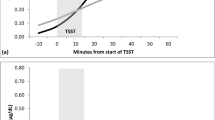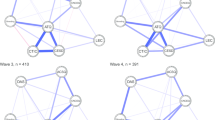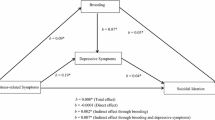Abstract
Background
Cognitive vulnerability-stress models explain depression as the result of an interaction between negative cognitive styles and stressful life events; however, the specific content of the cognitive diathesis varies by model.
Methods
This study examined three cognitive diatheses (i.e., unprimed cognitions, cognitive reactivity, and mood reactivity) in a prospective longitudinal design assessing currently non-depressed college students (N = 322) at the start of the semester with follow-up at the end of the semester, approximately 3 months later. At baseline, depressive symptoms, major depression history, negative life events in the past year, unprimed dysfunctional attitudes, and both cognitive reactivity and mood reactivity over a dysphoric mood induction were assessed. Depressive symptoms and negative life events in the interim were assessed at follow-up.
Results
After controlling for gender, past year negative life events, and baseline depression severity; unprimed dysfunctional attitudes significantly predicted subsequent depression severity, whereas cognitive reactivity and mood reactivity did not. None of the cognitive vulnerabilities interacted with negative life events over the interim to predict later depression. After controlling for gender, past year negative life events, baseline depression severity, and history of depression; mood reactivity and the mood reactivity × depression history interaction significantly predicted later depressive symptoms. Greater levels of mood reactivity predicted higher depressive symptoms in those with a history of depression and lower depressive symptoms in those without history of depression.
Conclusions
Results suggest that different vulnerabilities may be relevant to predicting increases in depressive symptoms over time in those individuals who have not previously been depressed vs. those who have.

Similar content being viewed by others
Data Availability
The datasets generated during and/or analyzed during the current study are available from the corresponding author on reasonable request.
References
Alloy, L. B., Abramson, L. Y., Hogan, M. E., Whitehouse, W. G., Rose, D. T., Robinson, M. S., et al. (2000). The Temple-Wisconsin Cognitive Vulnerability to Depression Project: Lifetime history of Axis I psychopathology in individuals at high and low cognitive risk for depression. Journal of abnormal psychology, 109(3), 403–418. https://doi.org/10.1037/0021-843X.109.3.403
Alloy, L. B., Abramson, L. Y., Walshaw, P. D., & Neeren, A. M. (2006). Cognitive vulnerability to unipolar and bipolar mood disorders. Journal of Social and Clinical Psychology, 25(7), 726–754.
Alloy, L. B., Abramson, L. Y., Whitehouse, W. G., Hogan, M. E., Panzarella, C., & Rose, D. T. (2006). Prospective incidence of first onsets and recurrences of depression in individuals at high and low cognitive risk for depression. Journal of Abnormal Psychology, 115(1), 145–156.
Abramson, L. Y., & Metalsky, G. I. (1989). The Cognitive Style Questionnaire: Measurement of negative cognitive styles about self and consequences. Unpublished manuscript.
Beck, A. T. (1967). Depression: Clinical, experimental, and theoretical aspects. New York: Hoeber.
Beck, A. T. (1987). Cognitive models of depression. Journal of Cognitive Psychotherapy, 1(1), 5–37.
Beck, A. T. (2008). The evolution of the cognitive model of depression and its neurobiological correlates. American Journal of Psychiatry, 165(8), 969–977.
Beck, A. T., Steer, R. A., & Brown, G. K. (1996). Beck depression inventory-II. San Antonio, 78(2), 490-498.
Burcusa, S. L., & Iacono, W. G. (2007). Risk for recurrence in depression. Clinical Psychology Review, 27(8), 959–985. https://doi.org/10.1016/j.cpr.2007.02.005
Czyz, E. K., Horwitz, A. G., & King, C. A. (2016). Self-rated expectations of suicidal behavior predict future suicide attempts among adolescent and young adult psychiatric emergency patients. Depression and Anxiety, 33(6), 512–519. https://doi.org/10.1002/da.22514
Dobson, K. S., & Breiter, H. J. (1983). Cognitive assessment of depression: Reliability and validity of three measures. Journal of Abnormal Psychology, 92(1), 107–109. https://doi.org/10.1037/0021-843X.92.1.107
Evans, J., Heron, J., Lewis, G., Araya, R., & Wolke, D. (2005). Negative self-schemas and the onset of depression in women: Longitudinal study. The British Journal of Psychiatry, 186(4), 302–307.
First, M. B., Spitzer, R. L., Gibbon, M. & Williams, J.B. (1996). Structured Clinical Interview for the DSM-IV Axis I Disorders.
Hankin, B. L., & Abramson, L. Y. (2001). Development of gender differences in depression: An elaborated cognitive vulnerability–transactional stress theory. Psychological Bulletin, 127(6), 773–796.
Hankin, B. L., Abramson, L. Y., Miller, N., & Haeffel, G. J. (2004). Cognitive vulnerability-stress theories of depression: Examining affective specificity in the prediction of depression versus anxiety in three prospective studies. Cognitive Therapy and Research, 28(3), 309–345.
Horwitz, A. G., Berona, J., Czyz, E. K., Yeguez, C. E., & King, C. A. (2017). Positive and negative expectations of hopelessness as longitudinal predictors of depression, suicidal ideation, and suicidal behavior in high-risk adolescents. Suicide and Life-Threatening Behavior, 47(2), 168–176. https://doi.org/10.1111/sltb.12273
Jarrett, R. B., Minhajuddin, A., Borman, P. D., Dunlap, L., Segal, Z. V., Kidner, C. L., et al. (2012). Cognitive reactivity, dysfunctional attitudes, and depressive relapse and recurrence in cognitive therapy responders. Behaviour Research and Therapy, 50(5), 280. https://doi.org/10.1016/j.brat.2012.01.008
Kërqeli, A., Kelpi, M., & Tsigilis, N. (2013). Dysfunctional Attitudes and their effect on depression. Procedia—Social and Behavioral Sciences, 84, 196–204. https://doi.org/10.1016/j.sbspro.2013.06.534
Klein, D. N., & Allmann, A. E. S. (2014). Course of depression: Persistence and recurrence. In I. H. Gotlib & C. L. Hammen (Eds.), Handbook of depression (pp. 64–83). New York: Guilford Press.
Kube, T., Glombiewski, J. A., & Rief, W. (2018). Situational expectations mediate the effect of global beliefs on depressive symptoms: A 1-year prospective study using a student sample. Current Opinion in Psychiatry, 31(5), 409–416. https://doi.org/10.1097/YCO.0000000000000443
Kube, T., Siebers, V. H. A., Herzog, P., Glombiewski, J. A., Doering, B. K., & Rief, W. (2018). Integrating situation-specific dysfunctional expectations and dispositional optimism into the cognitive model of depression—A path-analytic approach. Journal of Affective Disorders, 229, 199–205. https://doi.org/10.1016/j.jad.2017.12.082
Lewinsohn, P. M., Joiner, T. E., Jr., & Rohde, P. (2001). Evaluation of cognitive diathesis-stress models in predicting major depressive disorder in adolescents. Journal of Abnormal Psychology, 110(2), 203–215. https://doi.org/10.1037/0021-843X.110.2.203
Lewinsohn, P. M., Zeiss, A. M., & Duncan, E. M. (1989). Probability of relapse after recovery from an episode of depression. Journal of Abnormal Psychology, 98(2), 107. https://doi.org/10.1037/0021-843X.98.2.107
Miranda, J., & Persons, J. B. (1988). Dysfunctional attitudes are mood-state dependent. Journal of Abnormal Psychology, 97(1), 76–79. https://doi.org/10.1037/0021-843X.97.1.76
Moussavi, S., Chatterji, S., Verdes, E., Tandon, A., Patel, V., & Ustun, B. (2007). Depression, chronic diseases, and decrements in health: Results from the world health surveys. The Lancet, 370(9590), 851–858.
Sarason, I. G., Johnson, J. H., & Siegel, J. M. (1978). Assessing the impact of life changes: Development of the life experiences survey. Journal of Consulting and Clinical Psychology, 46(5), 932–946. https://doi.org/10.1037/0022-006X.46.5.932
Scher, C. D., Ingram, R. E., & Segal, Z. V. (2005). Cognitive reactivity and vulnerability: Empirical evaluation of construct activation and cognitive diatheses in unipolar depression. Clinical Psychology Review, 25(4), 487–510. https://doi.org/10.1016/j.cpr.2005.01.005
Segal, Z. V., Gemar, M., & Williams, S. (1999). Differential cognitive response to a mood challenge following successful cognitive therapy or pharmacotherapy for unipolar depression. Journal of Abnormal Psychology, 108(1), 3–10.
Segal, Z. V., Kennedy, S., Gemar, M., Hood, K., Pedersen, R., & Buis, T. (2006). Cognitive reactivity to sad mood provocation and the prediction of depressive relapse. Archives of General Psychiatry, 63(7), 749–755. https://doi.org/10.1001/archpsyc.63.7.749
van Rijsbergen, G. D., Bockting, C. L. H., Burger, H., Spinhoven, P., Koeter, M. W. J., Ruhé, H. G., et al. (2013). Mood reactivity rather than cognitive reactivity is predictive of depressive relapse: A randomized study with 5.5-year follow-up. Journal of Consulting and Clinical Psychology, 81(3), 508–517.
Weissman, A., & Beck, A. T. (1978). Development and validation of the Dysfunctional Attitude Scale. Paper presented at the meeting of the Association for the Advancement of Behavior Therapy, Chicago, November, 1978.
Wenze, S. J., Gunthert, K. C., & Forand, N. R. (2010). Cognitive reactivity in everyday life as a prospective predictor of depressive symptoms. Cognitive Therapy and Research, 34(6), 554–562. https://doi.org/10.1007/s10608-010-9299-x
Westermann, R., Spies, K., Stahl, G., & Hesse, F. W. (1996). Relative effectiveness and validity of mood induction procedures: A meta-analysis. European Journal of Social Psychology, 26(4), 557–580. https://doi.org/10.1002/(SICI)1099-0992(199607)26:4
Zimmerman, M., Sheeran, T., & Young, D. (2004). The Diagnostic Inventory for Depression: A self-report scale to diagnose DSM-IV major depressive disorder. Journal of Clinical Psychology, 60(1), 87–110. https://doi.org/10.1002/jclp.10207
Author information
Authors and Affiliations
Contributions
Both authors contributed to the study conception and design. Jessica Perez performed the data analyses and drafted the initial version of the manuscript. Kelly Rohan designed the parent study, acquired the data, and made critical revisions to the manuscript. Both authors read and approved the final manuscript.
Corresponding author
Ethics declarations
Conflict of Interest
Jessica Perez and Kelly J. Rohan declare no conflicts of interest to disclose.
Ethical Approval
This study was approved by the University of Vermont’s Committees on Human Research. All procedures performed in studies involving human participants were in accordance with the ethical standards of the institutional and/or national research committee and with the 1964 Helsinki declaration and its later amendments or comparable ethical standards.
Informed Consent
Informed consent was obtained from all individual participants included in the study.
Additional information
Publisher's Note
Springer Nature remains neutral with regard to jurisdictional claims in published maps and institutional affiliations.
Rights and permissions
About this article
Cite this article
Perez, J., Rohan, K.J. Cognitive Predictors of Depressive Symptoms: Cognitive Reactivity, Mood Reactivity, and Dysfunctional Attitudes. Cogn Ther Res 45, 123–135 (2021). https://doi.org/10.1007/s10608-020-10174-5
Accepted:
Published:
Issue Date:
DOI: https://doi.org/10.1007/s10608-020-10174-5




